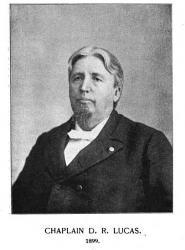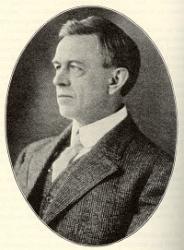Planning worship?
Check out our sister site, ZeteoSearch.org,
for 20+ additional resources related to your search.
- |
User Links
Person Results
D. R. Lucas

1840 - 1907 Author of "We Shall Like Him Be" in Hosannas to the King, No. 2 Daniel Robertson Lucas, b. Belvidere, Boone County, Ill., January 14, 1840; m. Mary Longley in 1862; joined 99th Indiana Volunteer Infantry and appointed chaplain of the regiment; later studied for the ministry; in 1876, settled in Des Moines, Iowa, where he pastored the Central Christian Church and helped found Drake University; Department Commander of the Grand Army of the Republic and secretary of the Morton Monument Commission; d. March 11, 1907
From Daniel R. Lucas papers, WWW site, Mar. 18, 2004
======================
Daniel Robertson Lucas, son of Albert and Catherine Robertson Lucas, was born in Belvidere, Boone County, Illinois, on January 14, 1840. In 1858, his family moved to Indiana where he enrolled at the Indiana Normal Institute at Burnettsville, White County, and began preaching at the local Christian church. After his marriage to Mary Longley in 1862, Lucas joined Company C Ninety Ninth Indiana Volunteer Infantry as a Second Lieutenant. On October 24, 1862, he was appointed chaplain of the regiment. Eighteen months later, he was transferred to the office of provost marshal where he served until the close of the War. The Ninety Ninth fought in the Vicksburg campaign, the second battle of Jackson, the Chatanooga campaign, the battle of Missionary Ridge, and many skirmishes.
After the War, Lucas studied for the ministry. In 1876, he settled in Des Moines, Iowa, where he pastored the Central Christian Church and helped found Drake University. In 1888, he returned to Indiana to pastor the Central Christian Church of Indianapolis. Lucas was Department Commander of the Grand Army of the Republic and secretary of the Morton Monument Commission. At the time of his death on March 11, 1907, he was pastor of the Seventh Church in Indianapolis.
Source: Cauble, Commodore Wesley. Disciples of Christ in Indiana: Achievements of a Century. Indianapolis: Meigs Publishing, 1930, page
Daniel R. Lucas, 1840-1907, was probably the youngest chaplain in the Civil War in Indiana. Soon after that conflict he studied for the ministry and did a great work, being pastor of the Central Church, Indianapolis, and also the Seventh Church. He was a very popular speaker for the Grand Army of the Republic and was secretary of the Morton Monument Commission. He was pastor of the Seventh Church at the time of his death.
--http://www.therestorationmovement.com/lucas.htm
D. R. Lucas
Charles M. Fillmore

1860 - 1952 Person Name: Chas. M. Fillmore Composer of "[Here we know not our awaiting]" in Grateful Praise Charles Millard Fillmore, 1860-1952
Born: July 15, 1860, Paris, Illinois.
Died: September 17, 1952, Indianapolis, Indiana.
Fillmore won a music scholarship at the Cincinnati College of Music, then taught for a year at Bath Seminary in Owingsville, Kentucky. He then traveled for about a year and taught singing classes in various parts of America. He then went for additional music studies in Cincinnati, Ohio. He studied for the ministry at Butler University in Indianapolis, Indiana, graduating in 1890. He pastored in Lafayette, Indiana; Shelbyville, Indiana; was "State Evangelist" (for one year) in Ogden, Utah; Peru, Indiana; Carthage, Ohio; and Hillside Church, Indianapolis, Indiana. He was one of the editors of the temperance paper Clean Politics, and of The Musical Messenger. He wrote several hundred Gospel songs in his lifetime.
--www.hymntime.com/tch
Charles M. Fillmore
J. B. Herbert

1852 - 1927 Composer of "[Here we know not our awaiting]" in Hosannas to the King, No. 2
J. B. Herbert


 My Starred Hymns
My Starred Hymns

